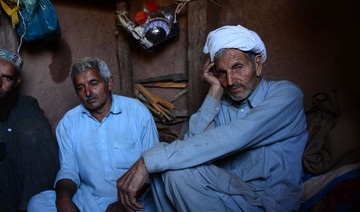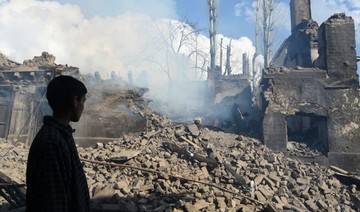NEW DELHI/ISLAMABAD: The sparring between India and Pakistan last month threatened to spiral out of control and only interventions by U.S. officials, including National Security Advisor John Bolton, headed off a bigger conflict, five sources familiar with the events said.
At one stage, India threatened to fire at least six missiles at Pakistan, and Islamabad said it would respond with its own missile strikes "three times over", according to Western diplomats and government sources in New Delhi, Islamabad and Washington.
The way in which tensions suddenly worsened and threatened to trigger a war between the nuclear-armed nations shows how the Kashmir region, which both claim and is at the core of their enmity, remains one of the world's most dangerous flashpoints.
The exchanges did not get beyond threats, and there was no suggestion that the missiles involved were anything more than conventional weapons, but they created consternation in official circles in Washington, Beijing and London.
Reuters has pieced together the events that led to the most serious military crisis in South Asia since 2008, as well as the concerted diplomatic efforts to get both sides to back down.
The simmering dispute erupted into conflict late last month when Indian and Pakistani warplanes engaged in a dogfight over Kashmir on Feb 27, a day after a raid by Indian jet fighters on what it said was a militant camp in Pakistan. Islamabad denied any militant camp exists in the area and said the Indian bombs exploded on an empty hillside.
In their first such clash since the last war between the two nations in 1971, Pakistan downed an Indian plane and captured its pilot after he ejected in Pakistan-controlled Kashmir.
Hours later, videos of the bloodied Indian pilot, handcuffed and blindfolded, appeared on social media, identifying himself to Pakistani interrogators, deepening anger in New Delhi.
With Prime Minister Narendra Modi facing a general election in April-May, the government was under pressure to respond.
"NO GOING BACK"
That evening, Indian National Security Adviser Ajit Doval spoke over a secure line to the head of Pakistan's Inter Services Intelligence (ISI), Asim Munir, to tell him India was not going to back off its new campaign of "counter terrorism" even after the pilot's capture, an Indian government source and a Western diplomat with knowledge of the conversations told Reuters in New Delhi.
Doval told Munir that India's fight was with the militant groups that freely operated from Pakistani soil and it was prepared to escalate, said the government source.
A Pakistani government minister and a Western diplomat in Islamabad separately confirmed a specific Indian threat to use six missiles on targets inside Pakistan. They did not specify who delivered the threat or who received it, but the minister said Indian and Pakistani intelligence agencies "were communicating with each other during the fight, and even now they are communicating with each other".
Pakistan said it would counter any Indian missile attacks with many more launches of its own, the minister told Reuters, speaking on condition of anonymity.
"We said if you will fire one missile, we will fire three. Whatever India will do, we will respond three times to that," the Pakistani minister said.
Doval's office did not respond to a request for comment. India was not aware of any missile threat issued to Pakistan, a government official said in reply to a Reuters request for comment.
Pakistan's military declined to comment and Munir could not be reached for comment. Pakistan's foreign ministry did not respond to a Reuters request for comment.
TRUMP-KIM TALKS
The crisis unfolded as U.S. President Donald Trump was trying to hammer out an agreement with North Korean leader Kim Jong Un in Hanoi over its nuclear programme.
U.S. security advisor Bolton was on the phone with Doval on the night of Feb 27 itself, and into the early hours of Feb 28, the second day of the Trump-Kim talks, in an attempt to defuse the situation, the Western diplomat in New Delhi and the Indian official said.
Later, U.S. Secretary of State Mike Pompeo, who was also in Hanoi, also called both sides to seek a way out of the crisis.
"Secretary Pompeo led diplomatic engagement directly, and that played an essential role in de-escalating the tensions between the two sides," State Department deputy spokesperson Robert Palladino said in a briefing in Washington on March 5.
A State Department official declined comment when asked if they knew of the threats to use missiles.
Pompeo spoke to Doval, the Indian and Pakistani Foreign Ministers Sushma Swaraj and Shah Mahmood Qureshi, respectively, Palladino said.
U.S. Indo-Pacific Command Admiral Phil Davidson told reporters in Singapore last week that he had separately been in touch with the Indian navy chief, Sunil Lanba, throughout the crisis. There was no immediate response from Lanba's office to a question on the nature of the conversations.
U.S. efforts were focused on securing the quick release of the Indian pilot by Pakistan and winning an assurance from India it would pull back from the threat to fire rockets, the Western diplomat in New Delhi and officials in Washington said.
"We made a lot of effort to get the international community involved in encouraging the two sides to de-escalate the situation because we fully realized how dangerous it was," said a senior Trump administration official.
The Pakistani minister said China and the United Arab Emirates also intervened. China's foreign ministry did not respond to requests for comment. The government of the UAE said Abu Dhabi Crown Prince Sheikh Mohammed bin Zayed al-Nahyan held talks with both Modi and Pakistan Prime Minister Imran Khan.
India has not given details, but has said it was in touch with major powers during the conflict.
On the morning of Feb 28, Trump told reporters in Hanoi that he expected the crisis to end soon.
"They have been going at it and we have been involved in trying to have them stop. Hopefully that is going to be coming to an end."
Later that afternoon, Khan announced in Pakistan's parliament that the Indian pilot would be released, and he was sent back the next day.
"I know last night there was a threat there could a missile attack on Pakistan, which got defused," Khan said. "I know, our army stood prepared for retaliation of that attack."
The two countries have gone to war three times since both gained independence in 1947, the last time in 1971. The two armies are trading fire along the line of control that separates them in Kashmir, but the tensions appear contained for now.
Diplomatic experts said that the latest crisis underlined the chances of misread signals and unpredictability in the ties between the nuclear-armed rivals, and the huge dangers. It still was not clear whether India had targeted a militant camp in Pakistan and whether there were any casualties, they said. "Indian and Pakistani leaders have long evinced confidence that they can understand each other’s deterrence signals and can de-escalate at will," said Joshua White, a former White House official who is now at Johns Hopkins.
"The fact that some of the most basic facts, intentions and attempted strategic signals of this crisis are still shrouded in mystery ... should be a sobering reminder that neither country is in a position to easily control a crisis once it begins.".
India, Pakistan threatened to unleash missiles at each other - sources
India, Pakistan threatened to unleash missiles at each other - sources
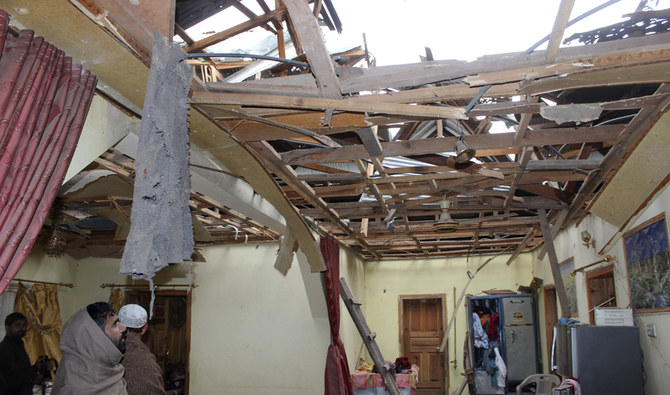
- Capture of Indian pilot after dogfight a trigger
- US leads intense efforts to defuse crisis
PM, president vow to end malaria, leading cause of illness and death in Pakistan
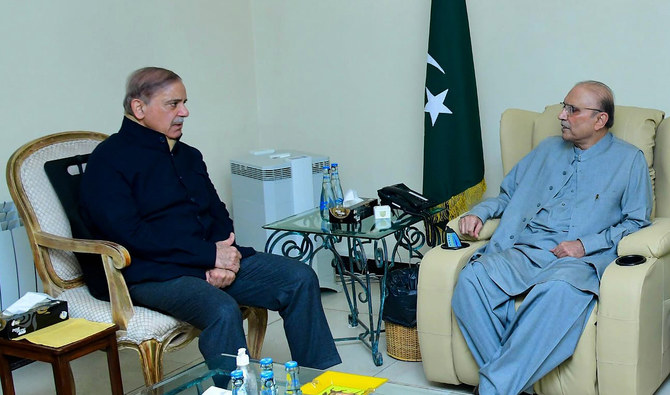
- Over 3.4 million suspected cases of malaria reported in Pakistan between Jan-Aug 2022
- Rapid upsurge observed in Balochistan and Sindh provinces after devastating floods in June 2022
ISLAMABAD: Pakistani top leaders on Thursday called on the government, international partners and organizations, health care professionals, and individuals to unite in their efforts to end malaria, one of the leading causes of illness and death in Pakistan according to the World Health Organization.
The Pakistani prime minister and president sent out the message on World Malaria Day, commemorated on April 25 each year to highlight the need for continued investment and sustained political commitment for malaria prevention and control. The day was instituted by WHO Member States during the World Health Assembly of 2007.
According to WHO data, from January through August 2022, more than 3.4 million suspected cases of malaria were reported in Pakistan compared with the 2.6 million suspected cases reported in 2021. Over 170 000 cases were laboratory confirmed.
A rapid upsurge in cases was observed in Balochistan and Sindh provinces after devastating floods in mid-June 2022, together accounting for 78 percent of all confirmed cases. The risk was assessed by the WHO as very high considering the effect of the flood crisis on the capacity of the national health system.
“In his message on the occasion of World Malaria Day, PM emphasized collaborative efforts to strengthen health care systems, increase access to quality diagnosis and treatment, and raise awareness about the importance of prevention and control measures of malaria,” state-run Radio Pakistan said, reporting on Prime Minister Shehbaz Sharif’s message.
The PM called on research and academic institutions “to flag scientific advances to both experts and the general public, international partners, companies and foundations to showcase their efforts and reflect on how to further scale up malaria control interventions.”
He said Pakistan had significantly enhanced free malaria testing and treatment facilities in malaria-endemic districts across the country through collaboration between the health ministry, national and international partners, provincial counterparts, NGOs and private stakeholders.
In a separate message, President Asif Ali Zardari emphasized collective efforts to curb malaria and expressed concerns over the rise in malaria cases due to the 2022 floods.
“Zardari called upon the provincial governments and other stakeholders to unite to deal with this alarming situation. He also called for raising awareness about the disease,” Radio Pakistan said.
Pakistan was hit by devastating floods in June 2022 which resulted in over 33 million people being affected, 81 districts being declared as calamity-hit and the national health infrastructure being badly impacted.
An upsurge in reported malaria cases was observed after the floods. In Sindh province, confirmed malaria cases in August 2022 reached 69,123 compared to 19,826 cases reported in August 2021. In Balochistan province, 41,368 confirmed cases were reported in August 2022 compared to 22,032 confirmed cases in August 2021. These two provinces together accounted for 78 percent of all reported confirmed cases in Pakistan in 2022.
Reports from 62 high-burden districts indicated that additional 210,715 cases were reported in September 2022, compared to 178,657 cases reported in the same districts in August 2022.
Pakistani PM seeks business community’s support to double exports in five years
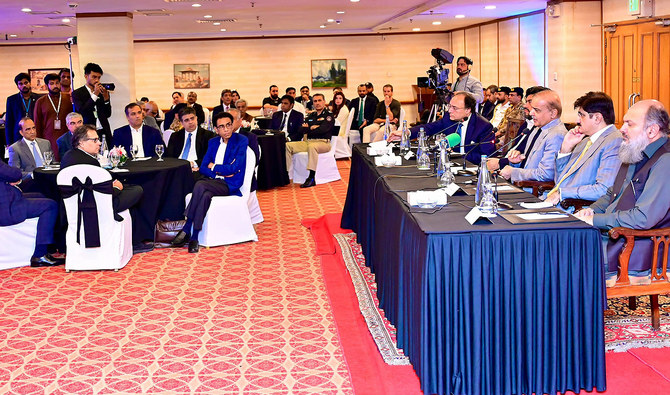
- Pakistan’s total exports during the current fiscal year, or July-March, stood at $22.93
- Pakistan wants to double exports through focus on textiles, agriculture, mining and IT
KARACHI: Prime Minister Shehbaz Sharif on Wednesday sought support from Pakistan’s business community to double export volume during the next five years of his government’s term.
Addressing business leaders in a ceremony held in the southern port city of Karachi, Sharif said the government, in consultation with the business community, would form a comprehensive policy framework to ensure export-led growth and resolve Pakistan’s foreign exchange reserve crisis.
Pakistan’s total exports during the current fiscal year, or July-March, stood at $22.93, which it wants to double through a focus on sectors like textiles, agriculture, mines and minerals and information technology.
“You are actually the backbone of the national economy as without your support, the government cannot bring the country out of economic crisis,” the prime minister told the business community, urging it to sit with his government to resolve issues and challenges.
“We should get together in the larger national interest. The brilliant minds should together find ways to overcome the challenges and problems hindering the country’s development and prosperity.”
Sharif’s meeting with the business leaders came as Pakistan is seeking a new long-term and larger IMF loan, with finance minister Muhammad Aurangzeb saying Islamabad could secure a staff-level agreement on the fresh program by early July.
The global lending agency has confirmed its executive board meeting for April 29 to discuss the approval of $1.1 billion funding for the South Asian state, the second and last tranche of a $3 billion standby arrangement with the IMF, which it secured last summer to avert a sovereign default and which runs out this month.
ADB highlights special focus on climate action, social equity in post-floods Pakistan
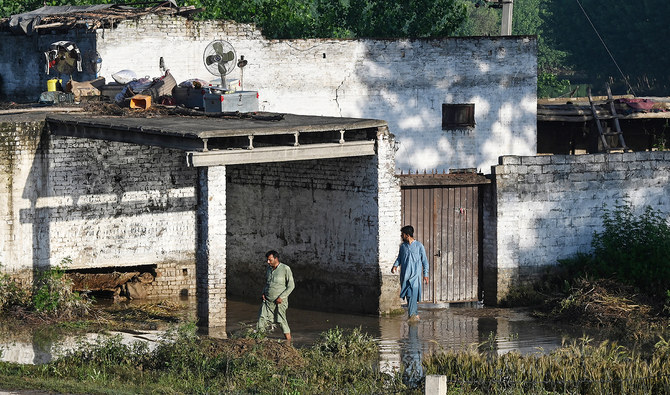
- The bank provided $180 million for climate-resilient, low-carbon municipal services in Punjab province last year
- It also worked to increase female inclusion in agriculture sector by helping them handle pesticides and fertilizers
KARACHI: The Asian Development Bank (ADB) announced on Thursday it deployed significant resources in Pakistan last year to aid the country’s economic recovery from the devastating 2022 floods, while supporting the government in other areas, including climate change, food security and gender parity, for sustainable and inclusive development.
The Philippines-based international financial institution began its operations in December 1966 and has since been promoting economic and social development in Asian and Pacific regions. Pakistan, one of its early members, has received ADB assistance over the years and developed many urban services and social sectors with its help.
In its Annual Report 2023, the ADB highlighted different areas in which it provided assistance to Pakistan during the last year.
“ADB signed a loan of $180 million to help develop climate-resilient and low-carbon municipal services for up to 1.5 million residents in the Punjab cities of Bahawalpur and Rawalpindi,” the report said.
“For Bahawalpur, the project includes a new recycling facility, a landfill with measures to mitigate greenhouse gas emissions and leachate, and new equipment and vehicles for citywide waste collection,” it continued. “For Rawalpindi, the project will, among other deliverables, construct a water treatment plant to process 54 million liters per day and implement distribution systems to serve around 82,000 households with metered connections.”
The report said the bank also signed an emergency grant of $5 million with the authorities in Islamabad to top up its flood assistance of $475 million from 2022.
“The grant supports farming households, including those headed by women, in the most flood-impacted area of Balochistan Province,” it informed. “It provides about 60,000 households with climate-resilient rice seeds sufficient to cultivate around 54,000 hectares, and includes measures to strengthen on-farm resilience to disasters triggered by natural hazards.”
The ADB also worked to improved agricultural productivity in the flood-affected Khyber Pakhtunkhwa province while trying to bolster the inclusion of women in by providing around 28,000 of them with training on seed cleaning and storage practices as well as on the safe handling of pesticides and fertilizers.
“ADB is also working to improve conditions for Pakistani women seeking to establish or expand their own businesses, particularly access to finance without the need for credit history or collateral,” the report added.
The bank also signed a $250 million loan for power transmission strengthening in the Khyber Pakhtunkhwa and Punjab provinces to help achieve environmental sustainability and climate resilience in the country’s power sector.
“The project aims to expand the national grid and enhance grid stability to improve energy access in the country, where only 80 percent of the population has access to electricity,” it said. “Upgrades under the project are expected to help supply 2 gigawatts of additional clean peak power and avoid about 13,700 tons of greenhouse gas emissions every year.”
ADB said it also provided a $300 million policy-based loan to the country for sustainable, broad-based and inclusive economic growth by strengthening the government’s capacity to generate domestic revenues to reduce budgetary constraints and restore macroeconomic stability.
“The program will help Pakistan improve tax administration and compliance, including through digitization,” the report said. “It will also enhance public expenditure and debt management, and increase trade and investment flows.”
Additionally, the bank committed $360 million under the Central Asia Regional Economic Cooperation (CAREC) program to help upgrade 330 kilometers of the national highway in Pakistan.
“This span of roadway links Pakistan’s hinterlands to CAREC Corridor 5, a vital trading route between landlocked Central Asian countries and the ports of Gwadar and Karachi,” it explained. “By enhancing the climate and disaster resilience of the highway, ADB is helping overcome high risks of road flooding and opening up a bottleneck to regional trade.”
Pakistan’s planning minister discusses enhanced educational ties with UK delegation
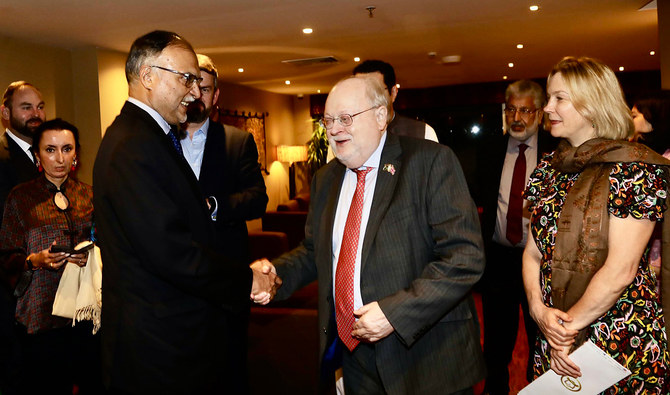
- Ahsan Iqbal proposes faculty training, research collaboration and UK campus expansions in Pakistan
- He says UK universities should develop specialized knowledge clusters through Pakistani scholars’ expertise
ISLAMABAD: Pakistan’s planning minister Ahsan Iqbal met a delegation from the United Kingdom, said an official statement on Thursday, to discuss the possibility of fostering closer ties and enhancing collaboration between the educational institutions in both countries.
British universities are a popular destination for Pakistani students due to the quality of education and the strong historical and cultural ties between the two countries.
Many students from Pakistan go to these educational institutions on scholarships offered by various organizations, such as the British Council, UK government and universities themselves, while others fund their studies independently.
The Pakistani planning minister presented various recommendations during his meeting with the delegation led by Steve Smith, the UK government’s International Education Champion, along with officials of the British High Commission.
He proposed faculty training programs to bolster academic expertise across borders, encouraging UK universities to establish campuses in Pakistan to promote educational accessibility and harnessing the expertise of Pakistani scholars in British universities to develop specialized knowledge clusters on the country.
“Pakistan envisions a future where universities in Pakistan are categorized into the Champions League (having first-tier universities) and the National League (having second-tier universities), driving excellence and accessibility in higher education,” Iqbal said during the meeting.
He highlighted the imperative for joint research initiatives, pointing at the importance of establishing joint research groups and fostering collaborations between PhD scholars from both countries.
The visiting delegation official reaffirmed the British government’s commitment to building international partnerships in education, citing the presence of over 20,000 Pakistani students in his country and 8,000 students who are pursuing degree programs in Pakistan with UK’s financial support.
The two sides also discussed procedural issues while pointing to the need for streamlined regulations, with a particular emphasis on minimizing hurdles for universities and strengthening the link between research institutions and economic growth.
They agreed to hold further dialogue and take concrete action toward implementing the planning minister’s recommendations to further solidify the foundation for enduring academic cooperation between the two countries.
US ambassador optimistic about Pakistan-IMF talks ahead of key funding meeting on April 29
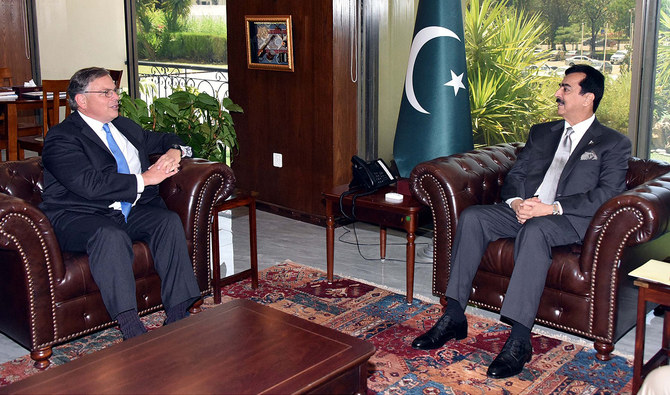
- The IMF has confirmed its executive board’s meeting to discuss the approval of $1.1 billion for Pakistan next week
- Ambassador Blome says the IMF’s positive feedback will further encourage investors and help Pakistan’s ailing economy
ISLAMABAD: US Ambassador Donald Blome expressed optimism over the ongoing negotiations between Pakistan and the International Monetary Fund (IMF) on Wednesday, as the global lending agency confirmed its executive board meeting for April 29 to discuss the approval of $1.1 billion funding for the South Asian state.
The funding is the second and last tranche of a $3 billion standby arrangement with the IMF, which it secured last summer to avert a sovereign default and which runs out this month. Pakistan is now seeking a new long-term and larger IMF loan, with finance minister Muhammad Aurangzeb saying Islamabad could secure a staff-level agreement on the fresh program by early July.
Ambassador Blome praised the performance of the country’s economic team in a meeting with the newly elected Senate chairman, Yousaf Raza Gillani, at the Parliament House wherein he also discussed strengthening of US-Pakistan bilateral relations.
“Acknowledging the positive economic indicators of Pakistan, Ambassador Blome noted the downward trend in inflation and high dollar reserves, stating that the IMF’s positive feedback would encourage investors,” said an official statement issued after the meeting. “He highlighted the flourishing gaming industry in Pakistan and called for enhanced [US-Pakistan] cooperation in the digital sector.”
The American envoy also noted the potential for further economic cooperation between the two countries in his conversation.
Pakistan’s $350 billion economy faces a chronic balance of payment crisis, with nearly $24 billion to repay in debt and interest over the next fiscal year — three-time more than its central bank’s foreign currency reserves.
Pakistan’s finance ministry expects the economy to grow by 2.6 percent in the current fiscal year ending June, while average inflation is projected to stand at 24 percent, down from 29.2 percent in fiscal year 2023/2024. Inflation soared to a record high of 38 percent last May.
With input from Reuters


